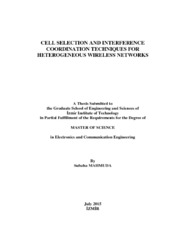Please use this identifier to cite or link to this item:
https://hdl.handle.net/11147/4467| Title: | Cell Selection and Interference Coordination Techniques for Heterogeneous Wireless Networks | Other Titles: | Heterojen Kablosuz Ağlar için Hücre Seçimi ve Karışım Önleme Teknikleri | Authors: | Mahmuda, Subaha | Advisors: | Özbek, Berna | Keywords: | Wireless communication systems Cell selection algorithms Heterogeneous networks |
Publisher: | Izmir Institute of Technology | Source: | Mahmuda, S. (2015). Cell selection and interference coordination techniques for heterogeneous wireless networks. Unpublished master's thesis, İzmir Institute of Technology, İzmir, Turkey | Abstract: | The rapid growth of traffic demands during past years, has led to the immense deployment of heterogeneous wireless networks consisting large-scale macro cells overlaid with multiple tiers of small cells. This is conceived as the major capacity and performance enhancement coordinator by means of increasing the spectral efficiency per unit area. However, heterogeneous networks implementation comprises new technical challenges related to interference issues and throughput deterioration. Advanced interference coordination techniques are introduced to handle these challenges. The usage of range expansion allows captivating more users and hence attaining performance improvement, however causes extra downlink interference. This becomes exquisite for higher bias values; hence the benefits convert into significant deterioration. To overcome these issues, range expansion should be jointly designed with inter-cell interference coordination. The main objective of this thesis is to analyze the concept of heterogeneous network, the cell selection strategies including range expansion, interference coordination schemes and energy efficiency. The performance evaluations are obtained to different macro-pico base stations deployment scenarios for heterogeneous network by using various cell selection algorithms with and without interference coordination depending on frequency allocation schemes to figure out their impact on the system performance for different contours. Geçmiş yıllarda hızlı gelişen tra k talebi ayrışık kablosuz ağların artmasına sebep olmaktadır.Ayrışık kablosuz ağlar üstüne küçük hücreler yerleşmiş makro hücreler içermektedir. Alan başına spektral verimliliği ar rarak büyük kapasite ve performans ar şı sağlamaktadırlar. Ancak ayrışık kablosuz ağların uygulanmasında girişim gibi sorunlarla karşılaşıl maktadır. Bu yöntem ile daha fazla kullanıcıya hizmet verilmesi sağlanmakta olup dolayısıyla daha iyi performansa ulaşılmaktadır. Hücreler arası oluşan bu girişimi çözmek için girişim koordinasyon teknikleri kullanılmaktadır ve böylece performans artışı gerçekleştirilmektedir. Bu tezin amacı ayrışık kablosuz ağlar kavramını analiz etmek, hücre genişletme hücre seçim stratejisini, girişim koordinasyonu ve enerji verimliliği kavramlarını irdelemektir. Çeşitli hücre seçme algoritmaları kullanılarak ayrışık kablosuz ağlar için makro kapsama alanında farklı sayıda piko baz istasyonları yerleştirilerek performans sonuçları elde edilmiştir. Girişimin etkisini analiz etmek için hücre seçimi ile girişim koordinasyonu algoritmalarının başarım sonuçları da elde edilmiştir. |
Description: | Thesis (Master)--Izmir Institute of Technology, Electronics and Communication Engineering, Izmir, 2015 Full text release delayed at author's request until 2018.08.25 Includes bibliographical references (leaves: 79-86) Text in English; Abstract: Turkish and English xiii, 86 leaves |
URI: | http://hdl.handle.net/11147/4467 |
| Appears in Collections: | Master Degree / Yüksek Lisans Tezleri |
Files in This Item:
| File | Description | Size | Format | |
|---|---|---|---|---|
| T001400.pdf | MasterThesis | 1.85 MB | Adobe PDF |  View/Open |
CORE Recommender
Page view(s)
262
checked on Jun 10, 2025
Download(s)
56
checked on Jun 10, 2025
Google ScholarTM
Check
Items in GCRIS Repository are protected by copyright, with all rights reserved, unless otherwise indicated.